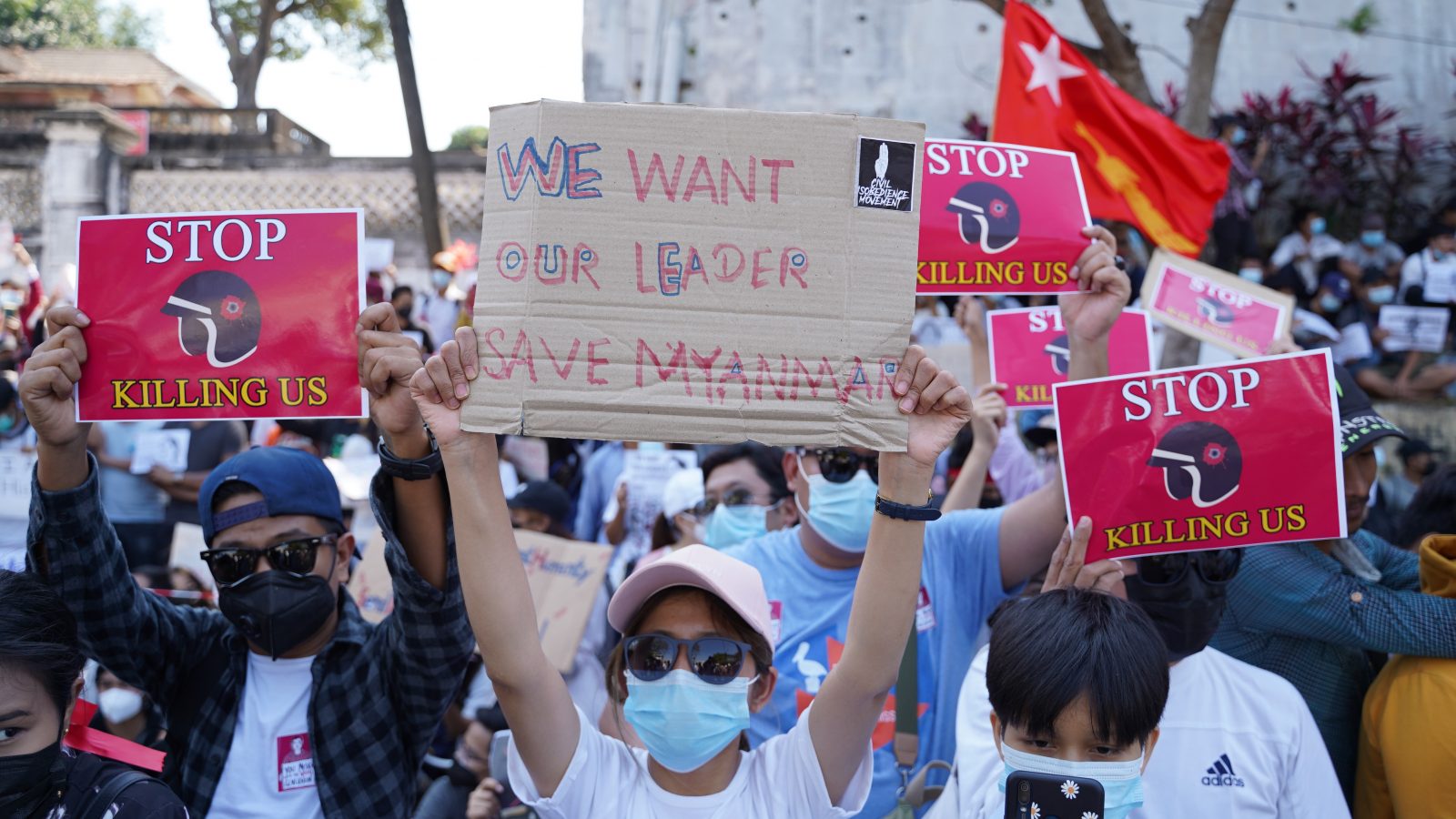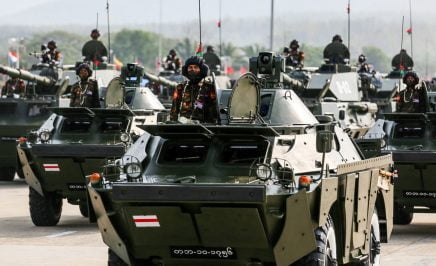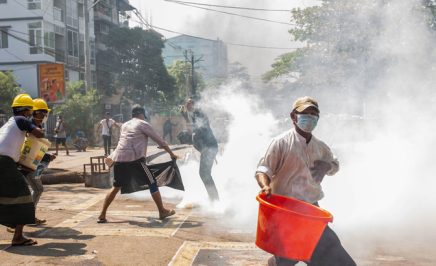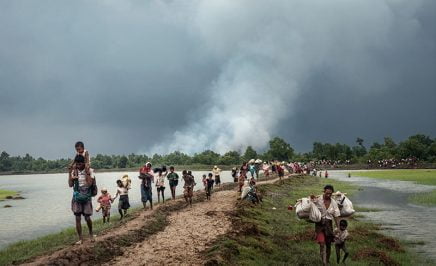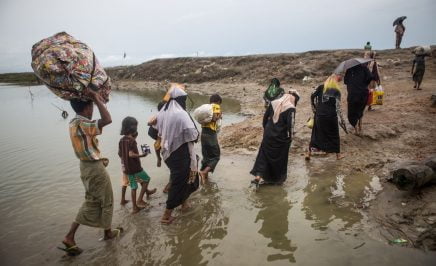Aviation fuel shipments to Myanmar have continued despite the military’s ongoing war crimes, Amnesty International and Global Witness said, after they identified more companies involved in the supply chain.
“We have traced new shipments of aviation fuel that have likely ended up in the hands of Myanmar’s military, which has consistently conducted unlawful air strikes. These attacks regularly kill civilians, including children, yet planes can only take off if they have fuel,” said Montse Ferrer, Amnesty International’s Researcher and Advisor on Business and Human Rights.
“Since the military’s coup in 2021, it has brutally suppressed its critics and attacked civilians from the ground and the air. Supplies of aviation fuel reaching the military enable these war crimes. These shipments must stop now.”
Hanna Hindstrom, Senior Investigator at Global Witness, which helped conduct the research, said: “We urge anyone involved in this trade to put people before profits and to cease supplying the fuel that facilitates these atrocities. We call on more states to enact or reinforce controls to prevent these supplies.”
Montse Ferrer said: “It is troubling that the Swiss-registered multinational fuel company Puma Energy, which committed to withdraw from Myanmar in October 2022, decided to sell its aviation fuel assets to a Myanmar business group which has imported fuel for the military.”
Deadly Cargo – Companies fuelling Myanmar’s military
On 3 November 2022, Amnesty International published Deadly Cargo, a report on the country’s aviation fuel supply chain that links national, regional and global companies to the Myanmar military.
Amnesty International, Global Witness and Burma Campaign UK have now identified other companies involved in aviation fuel transactions, which are likely to have reached the military in recent months.
One shipment involved the oil tanker Prime V, which sailed from Sikka in India on 28 November 2022. On or about 10 December, Prime V offloaded Jet A-1 grade aviation fuel at the former Puma Energy Aviation Sun Co. Ltd. (PEAS) terminal in the port of Thilawa in Myanmar.
One of the companies involved in this transaction is Reliance Industries Ltd of India, which owns the terminal from which Prime V departed. Sea Trade Marine, a Greek company, is the beneficial owner of Prime V, while Japan’s P&I Club provided the protection and indemnity (P&I) insurance. Amnesty International contacted the companies, yet only Japan P&I Club responded, saying that it complied with applicable sanctions at the time, and that its insurance cover may be terminated if a vessel is involved in illegal activity. There is no suggestion that the Prime V broke applicable laws in this delivery.
Details of an October shipment have also been obtained recently, showing that the tanker Big Sea 104 left the Bangchak Oil Refinery in Bangkok Port in Thailand on or about 8 October 2022.It arrived at Thilawa about a week later and offloaded 12,592 tonnes of Jet A-1, according to data from Kpler, a commodities information company, at the former PEAS terminal.
The refinery from which the ship departed is owned by publicly listed Thai company Bangchak Corporation Plc. Prima Marine Plc, another Thai company, is the beneficial owner of Big Sea 104, while Luxembourg-based The Shipowners’ P&I Club provided the insurance. None of these companies responded to Amnesty International’s letters.
“Each of these companies played a role in ensuring the Myanmar military continues to have access to aviation fuel to conduct unlawful air strikes. This has to end. All companies should stop their involvement in the aviation fuel supply chain to Myanmar,” said Montse Ferrer.
Sale of Puma Energy assets in Myanmar raises human rights concerns
At the time these two shipments arrived, the port terminal was controlled by the Myanmar subsidiary of Swiss and Singapore-based Puma Energy. In October 2022, Puma Energy said it was withdrawing from Myanmar after selling its assets to what it called a “locally owned private company” from which it claimed to have obtained undertakings to comply with “Human Rights laws” and not use assets to commit human rights violations.
Amnesty International has established that this buyer is Shoon Energy, formerly called Asia Sun Aviation, and that the sale was completed in December 2022.
Shoon Energy is part of a Myanmar business conglomerate, called Asia Sun, which imported aviation fuel on behalf of the military and distributed it to air bases. Following Puma Energy’s departure, this conglomerate now manages the main aviation fuel terminal in Thilawa port, Yangon, and, jointly with military-controlled Myanmar Petroleum Products Enterprise, the import and distribution of aviation fuel across the country.
Last month the UK and EU imposed sanctions on individuals and companies behind the Asia Sun group for their ties to the provision of aviation fuel to the Myanmar air force. Ahead of these sanctions, however, the Asia Sun conglomerate changed several of its companies’ names to Shoon Energy.
Montse Ferrer said: “Puma Energy has stated that the buyer of its Myanmar assets has undertaken to ‘comply with Human Rights law’. However, given the close relationship between Shoon Energy and the Myanmar military we are concerned this assurance is essentially meaningless.”
International community must act
Since companies continue to export aviation fuel to Myanmar, even while knowing the role that it plays in enabling war crimes being committed by the military, the international community must act.
Amnesty International and Global Witness have previously laid out a path forward: countries should suspend the export and transport of aviation fuel to Myanmar. Importantly, they should also suspend the provision of third-party services such as insurance, shipping or financial services to vessels involved in the shipment of aviation fuel to Myanmar.
Hanna Hindstrom said: “The international community has the tools in place to enact these restrictions. We should do what is in our power to reduce the Myanmar military’s capacity for terrorizing civilians.”
Background
According to the Myanmar Institute for Peace and Security, the military conducted 104 air strikes in 2021, and 243 in 2022.
On 1 February 2023, the second anniversary of the military coup in Myanmar, Canada and the UK announced measures to prevent aviation fuel from reaching the military, including targeted sanctions on Myanmar companies and individuals. On 20 February 2023 the EU sanctioned Asia Sun group and associated entities Asia Sun Trading and Asia Sun Energy.
In response to Amnesty International’s investigations for Deadly Cargo, the global shipping company Wilhelmsen said it would cease providing shipping services to any vessel transporting aviation fuel to Myanmar.
Korean Pan Ocean has also stated it would no longer allow its vessels to transport aviation fuel to Myanmar, and Thai Oil said it would put on hold any shipments of aviation fuel to Myanmar.
